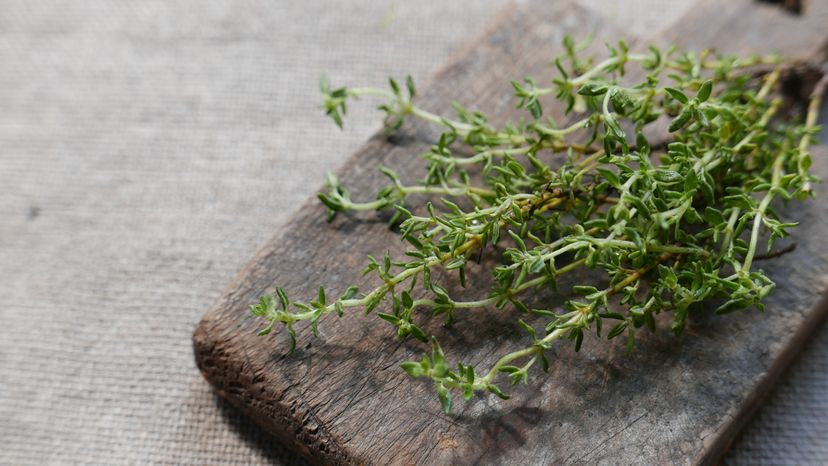
Thyme has a long and varied history of both medicinal and culinary use. Before the days of refrigeration, a drop of thyme volatile oil was placed in a gallon of milk to keep it from spoiling.
During the plague, townspeople gathered to burn large bundles of thyme and other herbs to keep the dreaded disease from their town. That's hopefully a use for thyme we'll never have to try -- but the herb is still used in a number of herbal remedies, including as a treatment for coughing, asthma and more.
Advertisement
Uses for Thyme
You can drink thyme tea for relief from coughs, bronchitis, and common colds. (Combining thyme with licorice or mint improves the flavor.) Thyme has a pronounced effect on the respiratory system; in addition to fighting infections, it dries mucous membranes and relaxes spasms of the bronchial passages.
The ability of thyme to relax bronchial spasms makes it effective for coughs, bronchitis, emphysema, and asthma. Its drying effect makes it useful to reduce the abundant watering of the eyes and nose associated with hay fever and other allergies. And gargling with thyme tea can reduce swelling and pus formation in tonsillitis.
Thyme combats parasites, such as hookworms and tapeworms, within the digestive tract. It is also useful to treat yeast infections.
To learn more about treating common medical conditions at home, try the following links:
- For an overview of all of our herbal remedies, go to the main page.
- To learn more about treating medical conditions at home, visit our main page.
- One of the best things you can do for your health and well being is to make sure you are getting enough of the vital nutrients your body needs. Visit our Vitamins page to learn more.
This information is solely for informational purposes. IT IS NOT INTENDED TO PROVIDE MEDICAL ADVICE. Neither the Editors of Consumer Guide (R), Publications International, Ltd., the author nor publisher take responsibility for any possible consequences from any treatment, procedure, exercise, dietary modification, action or application of medication which results from reading or following the information contained in this information. The publication of this information does not constitute the practice of medicine, and this information does not replace the advice of your physician or other health care provider. Before undertaking any course of treatment, the reader must seek the advice of their physician or other health care provider.Before engaging in any complementary medical technique, including the use of natural or herbal remedies, you should be aware that many of these techniques have not been evaluated in scientific studies. Use of these remedies in connection with over the counter or prescription medications can cause severe adverse reactions. Often, only limited information is available about their safety and effectiveness. Each state and each discipline has its own rules about whether practitioners are required to be professionally licensed. If you plan to visit a practitioner, it is recommended that you choose one who is licensed by a recognized national organization and who abides by the organization's standards. It is always best to speak with your primary health care provider before starting any new therapeutic technique.
Advertisement